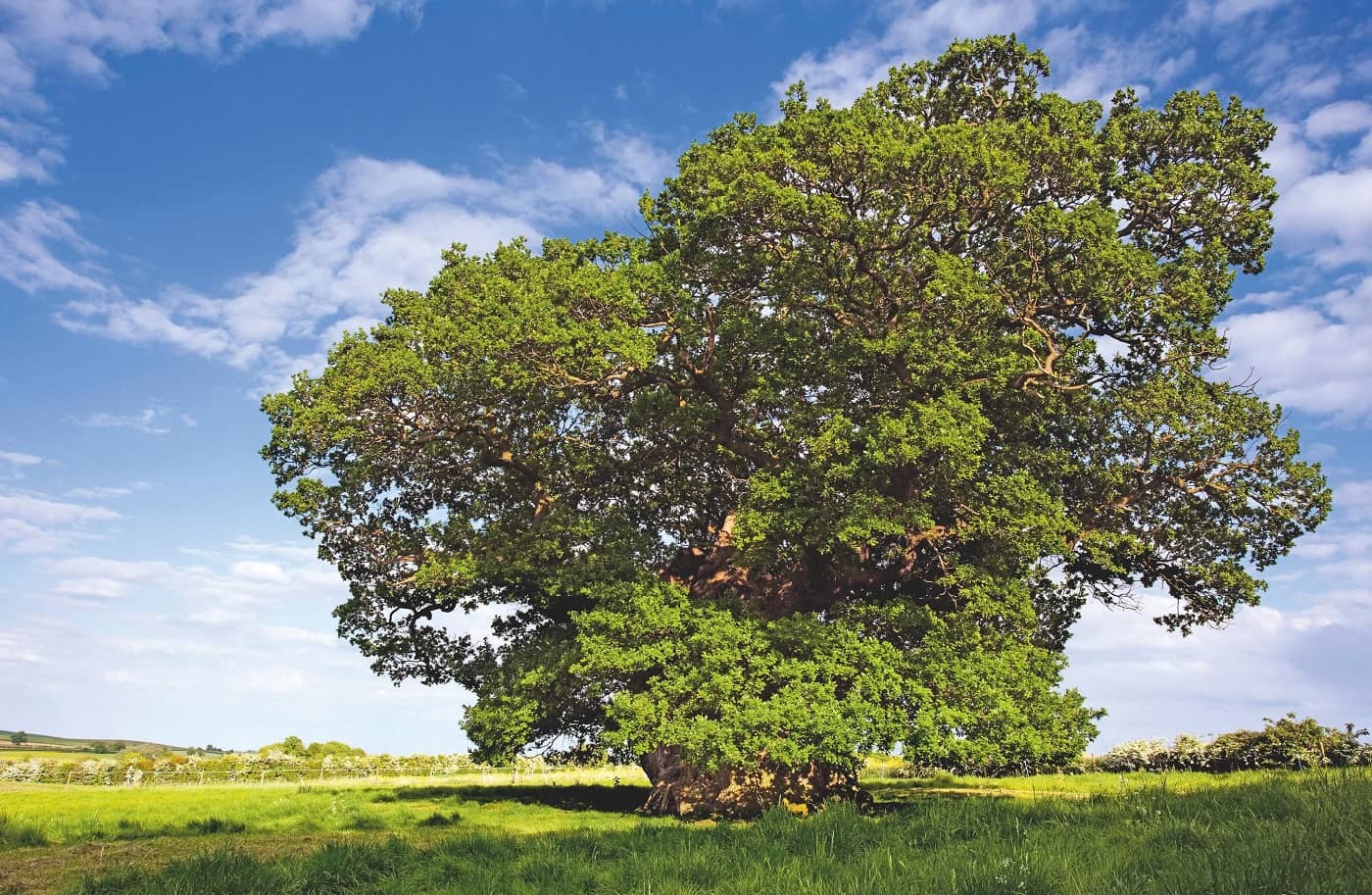For tree-loving landowners who want to leave their mark, nothing beats planting your own quercetum. Mark Griffiths celebrates the mighty oak and its determined collectors

GLANUSK is the Welsh seat of that noblest of trees, the oak. In spring and summer, the wilder parts of this glorious Powys estate are garlanded with coppery red and golden-green as our native Quercus robur and Q. petraea burst into growth.
Gracing its more frequented areas are specimens that celebrate royal visits, the oldest of which is an exotic Turkey oak (Q. cerris) planted by the Duke of Clarence in the 1880s. This tradition has flourished under Dame Shân Legge-Bourke, who inherited the estate from her father, the 3rd Baron Glanusk. It was crowned in 2012, when The Queen planted a fine example of Q. robur, Britain’s greatest tree and the tree that made Britain great.
Now, a new oak has joined this royal company: Q. rubra Magic Fire. A remarkable cultivar of a North American species, it’s distinguished by its manageable size, red twigs and leaves that resemble the Corinthian order’s acanthus motif in shape and progress in colour from chartreuse in spring to butter and honey in autumn. It was planted on July 4 this year by The Prince of Wales to mark the official opening of the Glanusk Quercetum, one of Britain’s largest collections of Quercus species and cultivars.
The quercetum owes its existence to Dame Shân’s late husband, William (‘Bill’) Legge-Bourke. He liked to collect acorn inspired artefacts until 1981, when he fell for the product of the real thing, a young oak given to him by Lord Fairhaven. Thereafter, he made time for oak hunting on the trips abroad demanded by his career in finance.
At Glanusk, he sprouted any acorns gathered on these forays and tended the results. He began to dream of creating a living museum of the world’s oaks, a landscape in which visitors would be captivated, as he had been, by the beauty, botany and ecological significance of these most exalted of trees. He took early retirement to pursue this vision.
This story is from the {{IssueName}} edition of {{MagazineName}}.
Start your 7-day Magzter GOLD free trial to access thousands of curated premium stories, and 9,000+ magazines and newspapers.
Already a subscriber ? Sign In
This story is from the {{IssueName}} edition of {{MagazineName}}.
Start your 7-day Magzter GOLD free trial to access thousands of curated premium stories, and 9,000+ magazines and newspapers.
Already a subscriber? Sign In

Tales as old as time
By appointing writers-in-residence to landscape locations, the National Trust is hoping to spark in us a new engagement with our ancient surroundings, finds Richard Smyth

Do the active farmer test
Farming is a profession, not a lifestyle choice’ and, therefore, the Budget is unfair

Night Thoughts by Howard Hodgkin
Charlotte Mullins comments on Moght Thoughts

SOS: save our wild salmon
Jane Wheatley examines the dire situation facing the king of fish

Into the deep
Beneath the crystal-clear, alien world of water lie the great piscean survivors of the Ice Age. The Lake District is a fish-spotter's paradise, reports John Lewis-Stempel

It's alive!
Living, burping and bubbling fermented masses of flour, yeast and water that spawn countless loaves—Emma Hughes charts the rise and rise) of sourdough starters

There's orange gold in them thar fields
A kitchen staple that is easily taken for granted, the carrot is actually an incredibly tricky customer to cultivate that could reduce a grown man to tears, says Sarah Todd

True blues
I HAVE been planting English bluebells. They grow in their millions in the beechwoods that surround us—but not in our own garden. They are, however, a protected species. The law is clear and uncompromising: ‘It is illegal to dig up bluebells or their bulbs from the wild, or to trade or sell wild bluebell bulbs and seeds.’ I have, therefore, had to buy them from a respectable bulb-merchant.

Oh so hip
Stay the hand that itches to deadhead spent roses and you can enjoy their glittering fruits instead, writes John Hoyland

A best kept secret
Oft-forgotten Rutland, England's smallest county, is a 'Notswold' haven deserving of more attention, finds Nicola Venning